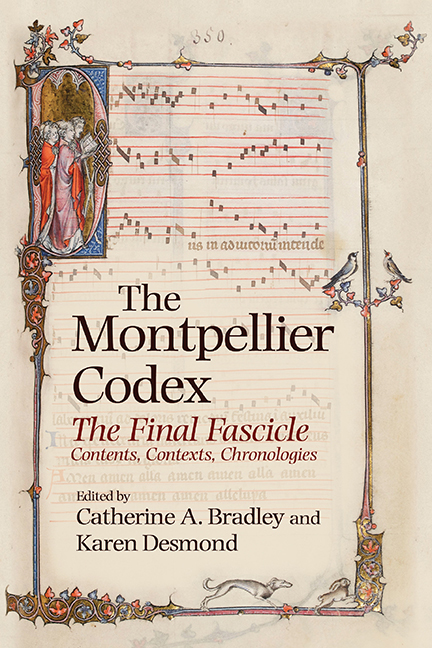Book contents
- Frontmatter
- Contents
- Figures
- Musical examples
- Tables
- Acknowledgements
- List of manuscript sigla
- Abbreviations
- Table of fascicle 8 contents
- Introduction
- I The Material Object
- II INNOVATION AND TRADITION
- 8 Texture, Rhythm, and Stylistic Groupings in Montpellier 8 Motets
- 9 Je le temoin en mon chant: The Art of Diminution in the Petronian Triplum
- 10 How Rhythmically Innovative is Montpellier 8?
- 11 Re-Presentation in the Ars antiqua: From Chant to Polyphony
- 12 … Que ne dit ‘cief bien seans’: Quoting Motets in Montpellier 8
- III ANALYTICAL CASE STUDIES
- Bibliography
- Contributors
- General index
- Index of compositions, alphabetical
- Index of compositions in Mo, manuscript order
- Miscellaneous Endmatter
12 - … Que ne dit ‘cief bien seans’: Quoting Motets in Montpellier 8
from II - INNOVATION AND TRADITION
Published online by Cambridge University Press: 04 July 2019
- Frontmatter
- Contents
- Figures
- Musical examples
- Tables
- Acknowledgements
- List of manuscript sigla
- Abbreviations
- Table of fascicle 8 contents
- Introduction
- I The Material Object
- II INNOVATION AND TRADITION
- 8 Texture, Rhythm, and Stylistic Groupings in Montpellier 8 Motets
- 9 Je le temoin en mon chant: The Art of Diminution in the Petronian Triplum
- 10 How Rhythmically Innovative is Montpellier 8?
- 11 Re-Presentation in the Ars antiqua: From Chant to Polyphony
- 12 … Que ne dit ‘cief bien seans’: Quoting Motets in Montpellier 8
- III ANALYTICAL CASE STUDIES
- Bibliography
- Contributors
- General index
- Index of compositions, alphabetical
- Index of compositions in Mo, manuscript order
- Miscellaneous Endmatter
Summary
MANY French motets contain refrains, which may or may not have an impact on their compositional process. If this introductory assertion happens to be true in what is commonly considered as the old corpus of the Montpellier codex, the relationship between motets and quotations appears to be slightly different in fascicle 8. Very few compositions, in fact, use true refrains, that is to say, refrains also extant in other narrative and/or lyric works. Instead, some of the French motets of fascicle 8 demonstrate quite a different way of borrowing poetic and/or musical material: they include entire quotations – which are not refrains – taken from other motets. This process also occurs earlier in the manuscript, although rarely. Sometimes, only the text is quoted, as in M25, Ma loiautés m'a nuisi (Mo 5,176, fol. 225v), which reproduces the same incipit as M147 (Mo 2,28, fol. 42r). But in other polyphonic compositions, text and music are similar. For instance, M9, Amoureusement me tient (Mo 5,76, fol. 114v), quotes ‘pour moi deduire et pour moi deporter’, which begins M28 (Mo 2,24, fol. 36v); M297, Mout me fu grief li departir (Mo 7,265, fol. 292r), begins with the same incipit as M196, Mout me fu griés li departir (Mo 3,37, fol. 66v), and the entire motetus significantly quotes other poetico- musical fragments taken from M196.
In Mo 8, three motets use textual and musical quotations of material that occurs in the previous fascicles. The triplum of Se je sui/Jolietement/OMNES (Mo 8,316) quotes, at its close, the incipit of Adam de la Halle's Entre Adan et Hanikel/Chief bien seantz/APTATUR (Mo 7,258). By contrast, Par une matinee/O clemencie/D'UN JOLI DART (Mo 8,309) and Au tans nouvel/Chele m'a tollu/'AI FAIT TOUT NOUVELETEMENT (Mo 8,312) quote no fewer than four different fragments from other compositions copied in the previous fascicles of the manuscript. I will focus on the latter two motets, whose quotations reveal a complex background of cross-references between multiple texts and melodies. Both fascicle 8 motets are built on vernacular tenors; all the quotations come from three-part motets; and all quotations reproduce a motet-voice incipit. However, their poetic registers are very different, and the quoting voice in Par une matinee/O clemencie/D'UN JOLI DART is the triplum, whereas in Au tans nouvel/Chele m'a tollu/'AI FAIT TOUT NOUVELETEMENT it is the motetus.
- Type
- Chapter
- Information
- The Montpellier CodexThe Final Fascicle. Contents, Contexts, Chronologies, pp. 211 - 230Publisher: Boydell & BrewerPrint publication year: 2018



